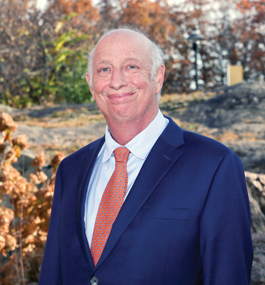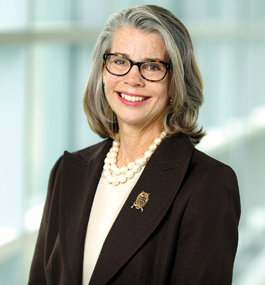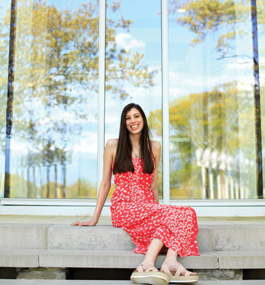Impact

Bob Mallet
A Scholarship for Business Undergrads Who Serve the Jewish Community
When retired Pittsburgh businessman Bob Mallet wanted to establish a scholarship at a university with Jewish ties, he reached out to Brandeis, visited the campus and was impressed by what he learned.
Last spring, Mallet established the Robert and Toni Mallet Endowed Scholarship with a $1 million gift. The scholarship provides financial assistance to undergraduate business students who have a commitment to the Jewish community. “I want to take someone who has potential but can’t afford school and give them a chance to succeed,” says Mallet, now a member of Brandeis International Business School’s board of advisers.
After a childhood colored by the early death of his father and the antisemitism he encountered at school, Mallet as a young man joined the family business, Mallet & Co., a manufacturer of specialty ingredients and equipment for the baking industry. He worked in the company’s factory and laboratory, in its distribution operation, and on its management team, he says, before eventually taking over as CEO, expanding the company’s annual revenue to nearly $60 million.
Mallet, who sold the company in 2010, remained at its helm until his retirement in 2016, around the time he began exploring his Jewish identity. He joined the board of Classrooms Without Borders, which sponsors trips for teachers to learn about the Holocaust and, in 2017, traveled to concentration camp sites in Poland. “I was crushed, I was devastated, I was shocked,” Mallet says. “I came back from that trip a changed person. I started taking classes in Jewish history.”
Mallet, who lives on a horse farm outside Pittsburgh with his wife, Toni, is also teaching, including at Brandeis International Business School. Last year, he spoke to two classes via Zoom, and during a visit in November he lectured twice in person.
“I am privileged to know Bob, and I am thankful he has found a home at Brandeis,” says Kathryn Graddy, dean of the business school and the Fred and Rita Richman Distinguished Professor in Economics. “Throughout his career, Bob has practiced business, in the words of Justice Brandeis, as ‘an occupation in which the amount of financial return is not the accepted measure of success.’”

Hannah Peters
The Brandeis Fund’s Ripple Effect
Every issue of Brandeis Magazine tells stories of remarkable generosity directed toward scholarships, faculty research programs and other specific areas central to maintaining Brandeis’ academic excellence. How fortunate we are to have so many committed philanthropists who give to areas of special interest to them.
The donors who give through the Brandeis Fund — or through general scholarships, Brandeis National Committee memberships and all other flexible vehicles — are equally invaluable. They make an indelible, enduring and direct impact on life at this university.
Donors of flexible gifts entrust Brandeis to use their support where the dollars will have the most impact — for faculty salaries, research, financial aid, student life, campus maintenance, athletics, the libraries, sustainability efforts and much more.
When the unexpected happens, flexible gifts provide critical support. For instance, the Brandeis Fund enabled the university to pivot quickly when COVID hit — we improved our IT infrastructure to allow for seamless online teaching and learning, and followed aggressive testing protocols to keep the campus safe. The Brandeis Fund ensures our educational mission stays on track, whatever challenges arise.
Of course, Brandeis isn’t all work and no play. Flexible gifts also support a robust student experience, allowing Brandeisians to make memories that remain long after graduation. The candle-lighting ceremony during New Student Orientation. The 24-Hour Musical. “Traying” during winter’s first snowfall. Triskelion dance parties. The Waltham Group. Hanging out for hours over lunch in Upper Usdan (or the Boulevard, as earlier classes remember it). Sunday-morning waffles in the dining hall. Senior Week. Flexible funds keep the entire campus humming and Brandeis traditions going strong.
Your philanthropy makes a tangible difference, however you direct it. We are deeply thankful for your trust and support. So please consider including the Brandeis Fund in your giving plans. Your generosity will help students have a life-changing experience during their time on campus. And a well-fed one, if weekend waffles are any indication.
Gratefully,
Hannah Peters
Interim Senior Vice President of Institutional Advancement

Lizzy Topper ’21
Parents Honor Alumna’s Achievements With Gift That Promotes Accessibility
From a young age, Lizzy Topper ’21, a dyslexic learner with ADHD, was encouraged by her parents, David Topper and Peggy Segal, both P’21, to be her own best advocate.
While Lizzy was a Brandeis student, the university’s Student Accessibility Support team were critical allies in this quest, helping her succeed at the highest levels inside and outside the classroom. Now Lizzy’s family is giving back, by making a gift to support accessibility initiatives at Brandeis.
Among its many services, SAS facilitates academic accommodations (such as test-taking extensions); helps students secure accessible housing and transportation; and, through its fellows program, provides peer-to-peer support.
In Lizzy’s case, the support team helped remove academic barriers, including those related to focusing and remaining seated for long periods; cleared the way for a waiver of Brandeis’ non-English language requirement; and provided her with a digital “smart pen,” which helped her take comprehensive notes during lectures. SAS made sure Lizzy’s professors were aware of her disabilities before she attended her first class.
The gift from Topper and Segal, former co-chairs of the Brandeis Parents Leadership Council, is expected to boost the efforts of the Campus Accessibility Committee, an interdisciplinary group of students, staff and faculty who identify and address accessibility concerns on campus. The annual resources generated by the gift will help the university acquire assistive technologies, improve physical accessibility and advance disability inclusion on campus, says SAS director Cara Streit.
For students like Lizzy, the transition to college can be challenging. “Students are faced with more independence than in high school, and the stakes are higher,” Streit says.
“Accessibility and intellectual achievement go hand in hand,” says Segal, who notes that providing support is an integral part of Brandeis’ DNA. The university “gave Lizzy the confidence to reach her full potential.”
In fact, Segal adds, when there’s broader accessibility and heightened awareness about accessibility issues, “the whole student body benefits.”
Since Lizzy’s graduation from Brandeis, her determination to succeed has continued to open doors: She’s currently working toward a master’s in social work at the University of Pennsylvania.
Remembering Two Leaders’ 100 Years of Service
On the same day last fall — Sept. 23 — Brandeis lost two University Fellows who were deeply dedicated to the institution: Barbara Ehrlich, G’08, of Rye, New York, and Cynthia Shulman, of Newton, Massachusetts. Together, they devoted more than 100 years of service to the university through their leadership roles within the Brandeis National Committee, most notably as national presidents. They will be greatly missed.
